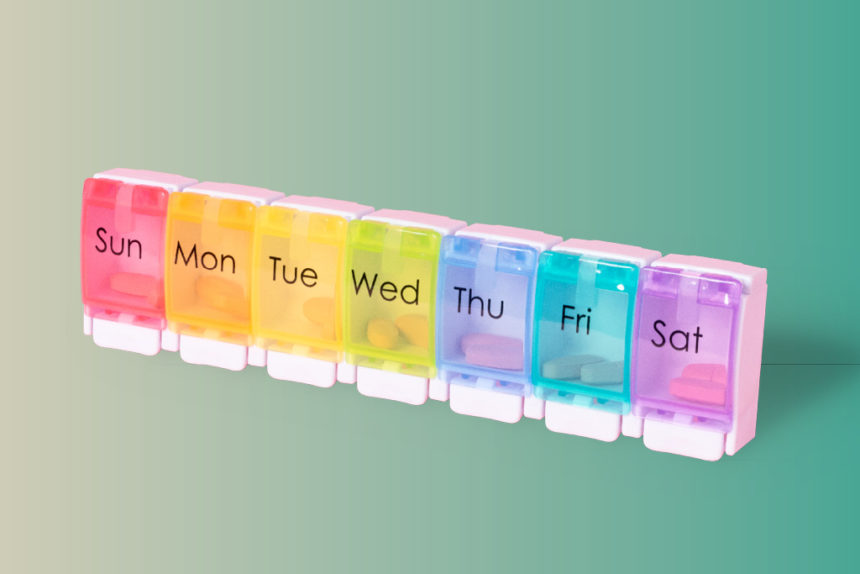Since COVID-19 reared its ugly head more than 18 months ago, public health experts have longed to bolster their pandemic toolbox with a pill that could easily treat coronavirus. They may finally have one.
Fluvoxamine, an off-patent, widely available antidepressant, significantly reduced COVID-19 hospitalization in the pill’s largest clinical trial to date, according to a study published Wednesday in The Lancet. One patient who got fluvoxamine died, compared to 12 deaths in the placebo group.
Therapies for COVID-19 already exist, but the monoclonal antibodies — such as those from Regeneron, Eli Lilly and Gilead —- are more expensive and harder to administer. They must be given in clinical settings through an IV drip (or series of shots), or in the home with a healthcare provider present to monitor possible signs of an allergic reaction. That ramps up the logistical hurdles.
Merck and Ridgeback Therapeutics’ experimental antiviral molnupiravir, which appeared to cut risk of hospitalization and death due to COVID-19 by 50% in a recent study, is not likely to be a silver bullet, either, given issues with testing and cost. (It may also need to be combined with other drugs to head off resistance.)
Fluvoxamine, a cheap generic tablet, is designed to be taken twice a day for 10 days and, at a reported cost of about $4 per course, would make treatment more accessible, especially in low- and middle-income areas. Adverse events seen were quite modest. Moreover, because the drug is approved, albeit for a different indication, doctors can start using it right away.
So, could it be that this repurposed medicine spells the beginning of the end for the pandemic? Not so fast. Doctors first need to see if results of the randomized controlled clinical trial hold up in the real world, as well as in comparison to the mAb therapies. Nor should its availability shelve the urgent public health push for preventative measures, namely vaccination with one of the COVID-19 shots.
Dr. Reynold Panettieri Jr., a pulmonary critical care physician and professor of medicine at Robert Wood Johnson Medical School, who was not involved in the 1,500-person fluvoxamine study, hailed the results on mortality, hospitalization and disease progression as “stunning.”
So much so that, “It would certainly change my practice patterns in getting calls from people who have COVID and have symptoms,” he said. “The safety of fluvoxamine, the ease of oral administration, the accessibility and its cost make it a very attractive first-line therapy.”
Nevertheless, Panettieri wants to see a head-to-head comparison with Gilead’s remdesivir, one of the mAb drugs, which may yet prove to be more effective than the pill in a large randomized clinical trial, and against Merck’s antiviral.
“I would reserve saying that you can switch whole hog before we have that data,” he cautioned.
Doctors such as Panettieri aren’t likely to wait for that readout, however. They’ll line up the available research on fluvoxamine — including a small December 2020 trial, published in JAMA, which hinted at the benefit — with those of the mAbs and molnupiravir for comparisons of their own.
While not as good as head-to-head trials, where a group of patients gets randomized to either drug and outcomes are compared, “Not everything in medicine is perfect, evidence-based or governed by randomized controlled clinical trials,” Panettieri noted.
That said, neither fluvoxamine — nor, for that matter, molnupiravir — are likely to be a substitute for vaccination. Although they do fill a major medical need.
“One of our biggest holes [in managing COVID-19] is, what do you do with someone who’s acutely ill and progressing?” Panettieri said. “The last thing we want is someone developing respiratory failure and being on a ventilator.”
That such cases are diminishing in frequency is in large part thanks to rising vaccination rates. But each of the therapies has nuances that make it more or less attractive. For example, evidence suggests Merck’s antiviral pill is protective for 12 months, said Panettieri, so that could be important in preventing breakthrough infections.
And adverse events, when fluvoxamine or molnupiravir are scaled up to a much larger population, could limit use. The mAb drugs could be reserved for use if a patient doesn’t improve 72 hours after starting on fluvoxamine, for instance.
Will fluvoxamine become a first-line therapy for COVID-19? Doctors will adjust course in real time.
“As we treat individual patients with individual approaches or precision medicine, each patient is a snowflake and, as a provider, you have to tailor the therapy to the patient,” Panettieri explained. “The good news is we have multiple choices and more arrows in our quiver to combat COVID-19 for those who develop the disease and are sick. That’s the really important takeaway here.”
Most importantly, perhaps, is that neither pill will unseat the reigning No. 1 public health tool: vaccines.
The COVID-19 shots are “not only No. 1, but also No. 2 and No. 3” in the public health armamentarium, said Panettieri. “There is no doubt in my mind that vaccines are incredibly effective. And the truth be told, the majority of the patients — if not exclusively — those in our hospital due to COVID are those who are not vaccinated,” he said.
“It’s not rocket science,” he added. “There will always be people who get vaccinated who do get the disease you’re trying to prevent. It’s just the nature of the game, but we see that far less with the anti-SARS-Cov2 vaccines compared to flu or [pneumonia shot] Pneumovax or other vaccines, so we need to vaccinate.”
One needs to be careful before proclaiming success in the latest study as signaling an end game, of sorts, in our long battle with the pandemic. Yet the data do add to mounting evidence that fluvoxamine — a repurposed, cheap, widely available drug — is life-saving in a larger population. And that’s another cause for optimism, even if tempered by a few caveats.







